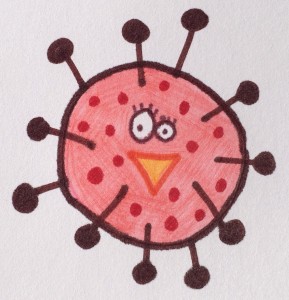Vaccine: Varicella Vaccine
Transmission:
The chickenpox is spread very easily from person to person. Your child can contract chickenpox by getting the fluid from someone’s chickenpox blister into their body or by inhaling droplets with viral particles spread by a cough or sneeze.
Symptoms:
Before the notorious chickenpox rash appears, your child would come down with a fever, headache, and stomach ache–symptoms that are common to many other diseases. However, about 10-21 days after you child has had contact with someone with chickenpox and has become infected, he would develop between 250 to 500 red spots with small, itchy, fluid-filled blisters. These blisters normally start on the face, middle of the body, or the scalp, then after a day or so become cloudy and scab. Following that, new blisters form in groups, often appearing around the mouth, in the vagina, and on the eyelids. If your child had prior skin problems, such as eczema, he may get thousands of blisters with the chickenpox.
Who is at Risk:
Most cases of chickenpox are seen in children under ten.4 If you were to get chickenpox as a teen or adult, you would often be much, much more sick that if you were to get it as a child. Most children who get chickenpox young, have mild cases and recover within a few weeks. Severe cases are more common in children whose immune systems are challenged due to other illnesses, medications, chemotherapy, and steroids.
Possible Complications:
- Hospitalization (2-3 people out of 1,000 cases)1
- Serious bacterial infections of skin lesions are the most common cause of hospitalizations.
- Encephalitis (1.8 people out of 10,000 cases)1 and may lead to seizures and coma
- Reye’s Syndrome
- Myocarditis–inflammation of the heart muscle
- Pneumonia–usually viral, but can be bacterial. Bacterial more common in children under one.1
- Transient arthritis
- Central nervous system (CNS) manifestations–range from aseptic meningitis to encephalitis.1 The most common CNS complication is cerebellar ataxia, which involves a very unsteady walk and generally has a good outcome.
- Death in 1 out of 60,000 cases1
- Rare complications of varicella: aseptic meningitis, transverse myelitis, Guillain-Barré syndrome, thrombocytopenia, hemorrhagic varicella, purpura fulminans, glomerulonephritis, myocarditis, arthritis, orchitis, uveitis, iritis, and hepatitis.1
Pregnancy/Unborn Child/Newborn Risk:
Women who get the chickenpox during pregnancy can pass the infection to the unborn baby. Mothers who have not been vaccinated or have not had chickenpox themselves, and who contract chickenpox during pregnancy may have babies born with congenital varicella syndrome (CVS). These babies may have low birth weight, skin scaring, and/or eye and neurologic abnormalities. Babies born with extreme CVS have a 30% mortality rate.1 If the mother is infected in the first 20 weeks of the pregnancy, the risk of having a child born with CVS is higher.
However, babies born to mothers who have had the varicella vaccine are not very likely to catch the chickenpox before they are one year old and are likely to have milder cases if exposed to the chickenpox.4 This is due to memory antibodies passed from the mother to the unborn child. Children who do not receive the vaccine and get chickenpox under the age of one are also susceptible to severe infection.
Prevention:
The varicella vaccine usually prevents the chickenpox disease entirely or makes the disease VERY mild if your child should catch it. No vaccine is 100% effective, however the varicella vaccine keeps 80-90% of people who are vaccinated completely protected.1 The vaccine always prevents severe infection.
Treatment:
If your child should get the chickenpox, there’s not much you can do but keep him comfortable. Try to keep him from scratching the blisters and keep clothing and bedding loose and light. Give him lukewarm baths with oatmeal or cornstarch and apply soothing moisturizer. Avoid exposure to heat and humidity, if possible. And if needed, over-the-counter oral antihistamines such as diphenhydramine (Benadryl) can be given, as well as hydrocortisone cream applied on itchy areas. Do NOT give aspirin or ibuprofen to someone who may have chickenpox!!
You should not give your child aspirin up to six weeks after getting the chickenpox. The use of aspirin has been associated with Reyes syndrome–a potentially fatal complication that effects that brain. Ibuprofen, also, can lead to more severe secondary infections. If anything, acetaminophen (Tylenol) can be given for pain relief.
Keep your sick child home from school and/or daycare until the blisters have dried out and crusted over.
Prognosis:
The crusted sores will not leave scars unless they have become infected with bacteria due to excessive scratching. And most children recover fully without complications. Once the child has fully recovered, the virus does not leave the body. It remains hidden–dormant–for many years. It can remain dormant for the person’s entire lifetime, or come back again, in times of extreme bodily stress. If it should come back again, the virus causes an extremely painful disease called shingles. This occurs in about 1 out of every ten adults.2 You need not worry about shingles in your child right now, as this disease usually shows up late in life. (More on shingles and the shingles vaccine at a later date.)
Resources:
- Centers For Disease Control and Prevention (CDC). www.cdc.gov
- Vaccines.gov. www.vaccines.gov
- Immunization Action Coalition. www.immunize.org
- MedlinePlus Medical Encyclopedia. www.nlm.nih.gov

